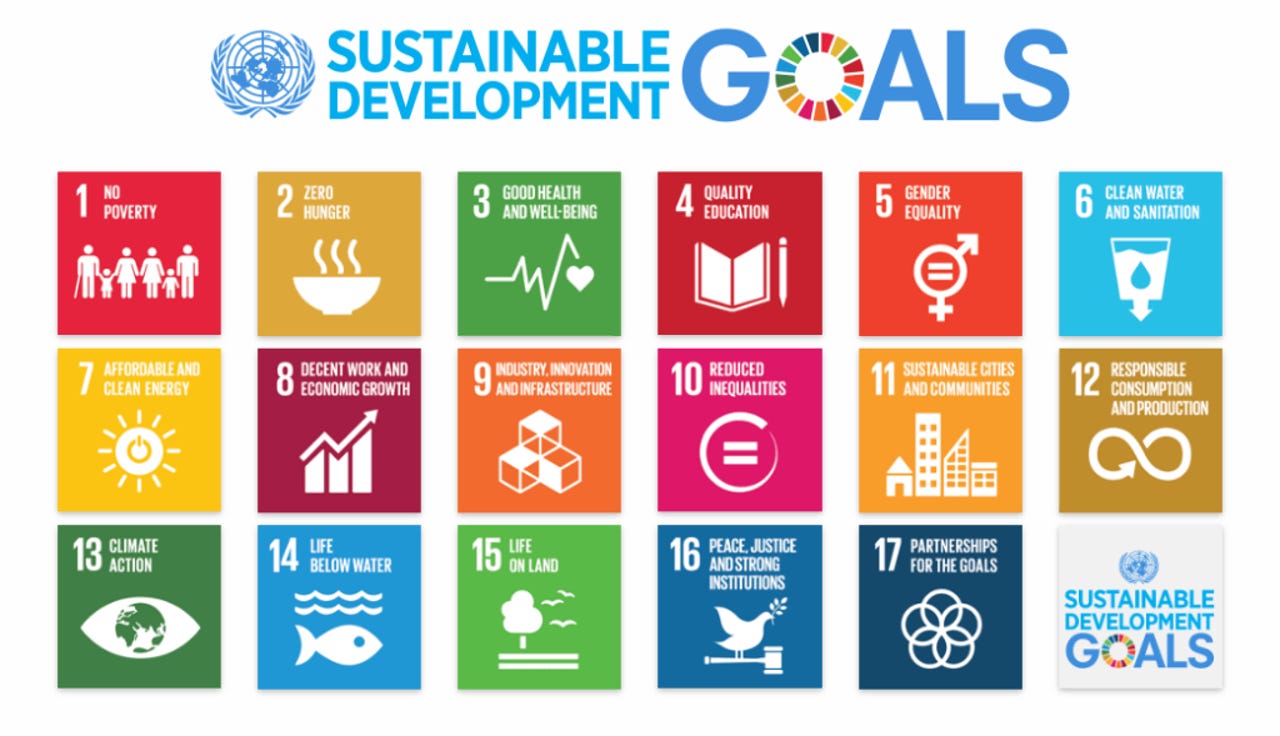Virtual work enables a more sustainable future

The UN believes 14 of its 17 Sustainable Development Goals can be solved or advanced through virtual work. Living and working in a sustainable way is more than just good business. It can impact everything from socioeconomics to diversity to climate issues.

United Nations Sustainable Development Goals (SDGs)
Karen Mangia, best-selling author of Working From Home: Making the New Normal Work For You and vice president customer and market insights at Salesforce, and I had the privilege of hosting an interactive roundtable with brilliant leaders from around the world who are investing to build a more sustainable future as part of the United Nations General Assembly's Sustainability Week.
"If there's one thing for certain in 2020, it's the fact that it's no longer business as usual," Natalia Latimer, vice president at Salesforce, shares to open the session. "Now is the time to recommit to company values and broaden the idea of who our stakeholders actually are -- our customers, employees, partners, shareholders, communities, and yes, even the planet."
"Across the world today we are facing a health crisis, an economic crisis, an inequality crisis, a leadership crisis, and a climate crisis," she continues. "Learning how to address any one of them can be paralyzing, never mind all of them. But we all have a platform for change and whether it's big or small, it is our responsibility to act. We need everyone to help drive the change our planet needs at the pace and scale necessary to feel the effects for current and future generations."
"We are already seeing the horrific effects of climate change with the wildfires on the West Coast, the flooding in the south, the burning Arctic and the list goes on," said Latimer. "I experienced for the first time not being able to leave my house for consecutive days due to poor air quality. It really brought to home it was a privilege to have clean air and that we all need to act now."
Virtual work positively correlates with improved economic sustainability and environmental sustainability for communities, countries and companies. pic.twitter.com/3tHxA4fsr7
— Karen Mangia (@karenmangia) September 22, 2020
Designing the future of work as flexible and location independent is one action every leader can take that leads to widespread sustainability results. Virtual jobs have the power change the lives of our workers, our businesses, and our communities. The next normal will be a hybrid model, where non-physical location-dependent workers will have the option to work from anywhere or the office. But in order for companies to provide this level of flexibility, they must invest in business applications and infrastructure that is mobile, secure, and scalable. Working from anywhere requires a culture, talent, process, and technology digital transformation with active support and advocacy from business leaders.
As the Founder of the Remote Work Association and Distribute Consulting. Laurel Farrer, collaborates with the world's leading businesses and governments to increase virtual job accessibility, train distributed leaders, and design economic initiatives. Her research and results demonstrate How Virtual Jobs Are Saving The World in three key areas:
- Economic empowerment: When workers are geographically dispersed, so is their impact on communities, industry innovation, and the global economy. The mobility of jobs also means that the growth of companies, industries, and employment rates are also decentralized. We can alleviate the pressures of urbanization by moving the economic impact of jobs, political parties, and education to the regions where diversification is needed most. Stimulating economic growth with remote jobs isn't just a theory, it's happening all over the world with incentive, education, and community programs designed to capitalize on the trend of remote work.
- Environmental Sustainability: Remote jobs create less waste and shorter commutes, which mean lighter carbon footprints. When considering the environmental impact of remote work policies, our minds usually jump to commutes and the air pollution benefits of 3.2 metric tons of carbon emissions and 313 gallons of gasoline that are saved per remote worker in a year. But that is just the beginning! Other climate crises such as water scarcity, food production (call out food-focused audience), energy usage, and accessible healthcare can also be addressed with the ability to mobilize our workforces. Imagine an office with no paper clips, vending machines, or file folders. That's a virtual job! Utilization of cloud technologies eliminates most of the physical waste that is traditionally produced in offices. Even better, location independent lifestyles spend more time at home, and therefore use less paper, plastic, mass-produced food sources, fast fashion, fossil fuels, and energy. If workplace independence were adopted by more businesses to earn B Corp certification worldwide, the impact to earth justice would be staggering.
- Diversity & Inclusion: Equal remote work earns equal opportunity. Period. It turns out that when managers are focused on the what of results, suddenly the who, when, and where don't matter as much. Consequently, traditional discriminatory factors like race, age, gender, and family status are reduced or eliminated in virtual workplaces. The asynchronous dynamics of distributed teams are able to support professionals with invisible barriers that require more cognitive processing time, sensory suppression, or behavioral accommodations, such as autism, dyslexia, attention deficit disorder, or depression.
It is an honor for @karenmangia and I to speak at the @UN and @YPO about how working from anywhere can further advance 14 of the 17 sustainable development goals (SDGs).
— Vala Afshar (@ValaAfshar) September 20, 2020
We have written 20 articles during the pandemic on this topic. https://t.co/U4WnkRwia8 pic.twitter.com/Q3p3u3DOr2
The shift to virtual work is also an opportunity to create more sustainable communities with greater economic vitality, improved education systems, and reduced unemployment. "Stimulating economic growth with remote jobs isn't just a theory," Farrer explains, "it's happening all over the world with incentive, education and community programs designed to capitalize on the trend of remote work."
To learn more about how sustainable communities and economic empowerment are being realized with virtual work, explore:
- The Estonian E-Residency
- The Vermont Remote Worker Grant Program
- The Utah Rural Online Initiative
- Grow Remote
- Tulsa Remote
- The Locana, Italy Relocation Incentive
- Santiago, Chile
- Telework Virginia
- The Telecommuting Act in the Philippines
- Remote Panda (India)
- Japan Telework Day
Mahatma Gandhi famously said, "Be the change you wish to see in the world." The shift is a gift to make choices and changes that lead to a more sustainable future.
How are you leading through change with the adoption of a 'work from anywhere' mindset and practices? Join us to share more @karenmangia and @valaafshar.
This article was co-authored by Karen Mangia, vice president, customer and market insights, at Salesforce.
Karen engages customers globally to discover new ways of creating success and growth together. From Executive Advisory Boards to strategic consulting engagements, her insights are central to Go-to-Market strategy, product development, marketing, and branding. In addition, Karen influences industry thought leadership in her role as Chair of the Customer Experience Council for The Conference Board. Formerly responsible for Insight Innovation at Cisco Systems, she led a global team with oversight into Customer Satisfaction and Experience, Diversity Business Practices, and Global Offset and Countertrade. Karen is also the author of Success With Less and a TEDx speaker.